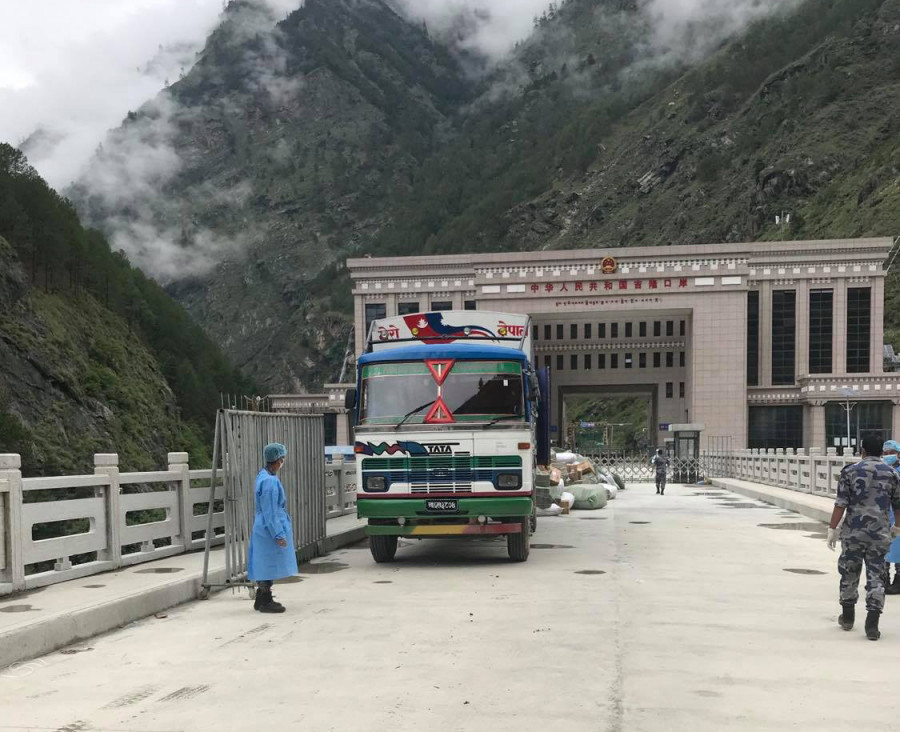Money
Kerung border reopening brings little joy to traders
Exports from Nepal are allowed to pass every fortnight while imports to Nepal are permitted to pass daily, officials say.
Krishana Prasain
Nepali traders had cheered when China allowed two-way trade to resume at the Rasuwagadhi-Kerung border last month, but they are finding out that the joy may have been premature.
Beijing has declared that exports from Nepal will be allowed to pass only on a fortnightly basis. Imports to Nepal, however, are permitted to pass daily, officials said.
“For now, China has allowed 14 goods carriers to cross the border every fortnight,” Narayan Prasad Bhandari, chief of the Rasuwa Customs Office, told the Post.
“They say this is because they have to disinfect the vehicles. They also keep Nepali exports in quarantine for a few days before forwarding them to key Chinese cities,” he said.
Exporters pile up their goods at the customs yard in Rasuwa, and complete the paperwork like customs declaration. “The goods are then dispatched, and this is done every fortnight,” Bhandari said.
Nepali traders say they are happy that China has allowed two-way trade, but the new provision is still like a trade embargo.
Nepal has shipped goods worth Rs50 million to China since December 22 when exports were again allowed. Before that, only imports were allowed, and that too with restrictions.
According to Bhandari, there were at least two consignments to China in the last three weeks. A total of 28 goods carrying containers passed through the border point loaded with handicraft items like copper utensils, bamboo seats, Nepali paper and carpets, among others.
Nepali officials at the highest levels have long been requesting Beijing to resume full-fledged trade via the northern border points.
“Before the pandemic, five to six cargo containers used to depart for China. But exports stopped for three years from March 2020,” Bhandari said.
"After Covid-19, Chinese containers would bring goods up to the border point where they were transferred to Nepali goods carriers," Bhandari said.
“It is the same with exports, which increases the cost,” said Bhandari. “If Nepali containers are allowed to go to Kerung for both import and export, this may reduce costs significantly,” he said.
Nepali traders, who suffered huge losses due to the disruption in cargo movement, have long been demanding a full-fledged resumption of export and import from the Rasuwagadhi-Kerung-Jilong and Tatopani-Zhangmu border points.
For the past 35 months, Nepali traders have been importing goods in small quantities through the Rasuwagadhi-Kerung border point, while trade through the Tatopani-Zhangmu point remains at a complete stop.
Initially, China had closed the border point in early 2020 because of heavy snowfall and the Lhosar festival.
After the coronavirus was declared a pandemic by the World Health Organisation on March 11, 2020, countries were compelled to close their borders and impose lockdowns to prevent the disease from spreading.
Besides Covid-19, poor infrastructure on the Nepali side and frequent landslides along the road remain obstacles to using the trading point to its full potential.
Dayananda KC, chief of the Tatopani Customs Office at Larcha, Sindhupalchok, says that exports through the Tatopani border point have not reopened while imports are restricted.
Accordion to KC, they had communicated with Navaraj Dhakal, the consulate general of Nepal in Lhasa, a few days ago.
“Chinese authorities have agreed to open the Tatopani border point to two-way trade too,” said KC. He added that only five containers were arriving daily via the Tatopani border point.
The Tatopani border point was completely closed in 2015 after the earthquake, and it came into partial operation after the construction of the dry port in 2019.
“China has removed all the structures and residences in Khasa, and is concentrating on the Kerung border point as it is being developed for international connectivity,” KC said. “China has a long-term focus on trade through Kerung.”
According to KC, the Tatopani trade point is viable for traders due to the cost factor and its proximity to Kathmandu. “The transportation cost while bringing goods from Rasuwa comes to around Rs100,000, but the freight charge from Tatopani is only Rs35,000. So traders prefer Tatopani for trading,” KC said.
Ram Hari Karki, vice-president of the Nepal Trans Himalayan Border Commerce Association, said that exports might increase in the coming days as Beijing has just opened the border after a long time.
“Imports may have slowed in recent days due to high bank interest rates and a stronger US dollar,” said Karki.
China still has not allowed movement of people through the border point while it has opened the air routes to travellers.
According to the Department of Customs, Nepal suffered a trade deficit of Rs263.97 billion with China in the last fiscal year 2021-22.
Nepal imported goods worth Rs264.78 billion while exports amounted to a meagre Rs808.75 million.
The trade deficit with China reached Rs94.33 billion in the first five months of the current fiscal year ended mid-December.
Nepal imported goods worth Rs94.58 billion and exported goods worth Rs244.72 million. The main imports from China are readymade garments, footwear, electronic goods, household items and fruits.




 8.22°C Kathmandu
8.22°C Kathmandu














